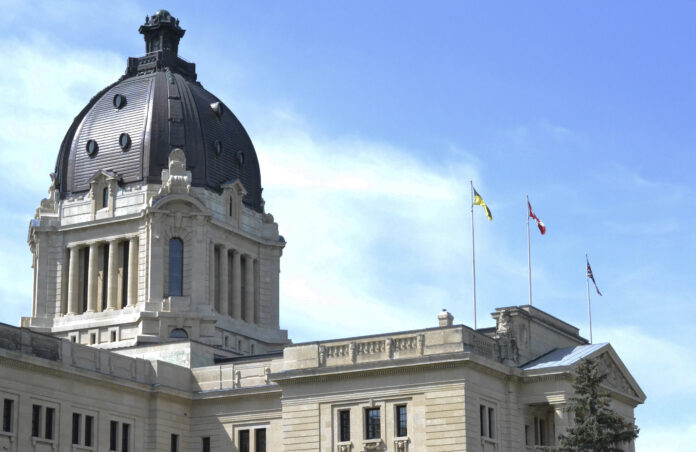The provincial government expanded vaccine booster shot eligibility on Tuesday.
That means individuals ages 50 and older, far north residents ages 18 and older, healthcare workers, residents living in First Nations communities, and residents with underlying health conditions born in 2009 or earlier are eligible. The expansion comes into effect immediately.
Saskatchewan Public Safety Agency (SPSA) president Marlo Pritchard made the announcement during a Provincial Emergency Operations Centre (PEOC) technical briefing. Pritchard said they’ll keep adding additional age groups to the eligibility list, with the goal of having all adult residents eligible by 2022.
Residents who already received a third booster dose for travel purposes do not require a fourth dose at this time.
In regards to getting a booster dose if an individual has received two doses of the two dose vaccines (Pfizer BionTech, AstraZeneca, Moderna) or one dose of the single dose vaccine (Janssen), they are considered fully vaccinated 14 days after receiving your last dose.
Pritchard said providing the doses is not going to be an issue.
“There are lots of vaccine supply on hand,” he said. “The province of Saskatchewan has sufficient vaccine in the province to support COVID-19 vaccinations for all residents 12 years and older, pediatric vaccinations 5 to 11 and all booster and third dose vaccinations.”
According to the government release, individuals may experience waning immunity due to factors like age or underlying conditions that impact the body’s ability to mount a strong immune response to the vaccines.
Chief Medical Health Officer Dr. Saqib Shahab explained that the way the current rollout works will affect the rollout opening in January.
“We do expect to make boosters available for everyone 18 and over in early January, so we would advise everyone who is currently not eligible to watch for that update early in January,” he said. “Again, we really hope, as we said earlier, that people who are eligible now come forward … to make that process smooth, so that once this initial phase has a satisfactory uptake eligibility will open we feel early in the new year for everyone 18 and older.”
“We hope as many people as possible will take advantage of this as long as they are five months after their second dose,” Shahab added.
Fully vaccinated individuals are also at-risk of potential breakthrough infections based on the rate of community transmission. Electing to receive a booster dose may increase long-term immune response and provide further protection against COVID-19 transmission. It will decrease the risk of contracting COVID-19 and, if you do contract COVID-19, will reduce the risk that you become seriously ill.
Booster doses can be received through any Saskatchewan Health Authority (SHA), Indigenous Services Canada (ISC), Northern Inter-Tribal Health Authority (NITHA) clinic currently as well as through participating pharmacies.
Information on booking an appointment or clinics is available at saskatchewan.ca/covid-19.
They also advise to not book a booster dose prior to your five-month eligibility.
The date of your last dose will be verified at the point of immunization and if it has not been five months since your last dose, you will not be able to receive your immunization
You can find the date of your last dose on your COVID-19 vaccination wallet card or on your COVID-19 QR code app.
When asked about rapid testing kits with passed expiration dates Pritchard said that they are safe and accurate.
“Health Canada has extended the expiry date, basically the expiry date that is printed on the label if it ends in 2021 you can add 10 months to that and if it expires in 2022 you can add four months to it. Health Canada has reviewed it, has authorized extending the shelf life and they are safe and accurate to use,” Pritchard said.
SHA staff redeployment ahead of targets
Pritchard said the Saskatchewah Health Authority (SHA) is ahead of schedule when it comes to resuming services affected by COVID-19 redeployments.
As of Tuesday, roughly 93 per cent of redeployed staff who were working in support areas like testing, contact tracing, and outbreak management have returned to their home positions. Meanwhile, roughly 125 of the 229 staff redeployed to support ICUs and acute care services have returned back home. That accounts for roughly 55 per cent of staff redeployed in those areas.
The staff returns mean that 283 of the 395 services that were slowed since early September have been fully resumed, while 58 per cent have been partially resumed.
“The SHA will continue redeploying staff supporting ICUs and acute care services back to their home position as COVID pressures and overall ICU numbers decline,” Pritchard said.
Pediatric vaccine rollout performing well
As of Tuesday, roughly 87 per cent of residents 12 years and older, and 82 per cent of residents five years and older, have received their first dose. Roughly 82 per cent of residents 12 and older are fully vaccinated. For those five and older, the number is 74 per cent.
Roughly 36,000 doses have been provided to children between the ages of five and 11, which equals around 32 per cent of the eligible population.
“(That) is absolutely fabulous to see since it has only been two weeks since the rollout of the pediatric vaccines,” Pritchard said.
Shahab explained that getting the 5 to 11-year-old group vaccinated with first doses over December is critical as they can be eligible for second doses in January onward.
“We still have some unfinished business for first and second doses,” he said. “As you know, many parts of the province have low COVID cases, but we continue to see higher case numbers in some southern rural areas, (like) South Central, South East, Central East, for example, and also North and Far North. Although a first and second dose uptake has increased (in ages groups) 12 and older, we would still like that to continue.”
michael.oleksyn@paherald.sk.ca


